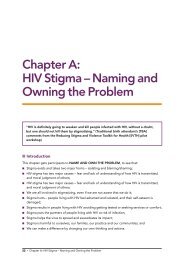Implementing Multiple Gender Strategies to Improve HIV and ... - ICRW
Implementing Multiple Gender Strategies to Improve HIV and ... - ICRW
Implementing Multiple Gender Strategies to Improve HIV and ... - ICRW
Create successful ePaper yourself
Turn your PDF publications into a flip-book with our unique Google optimized e-Paper software.
IMPLEMENTATION AND RESULTS<br />
Start-up <strong>and</strong><br />
Implementation<br />
Process<br />
ASWHAN generated proposals from potential support groups by<br />
advertising through multiple channels, including Internet forums, a network<br />
of various civil society groups, the Network of People Living with <strong>HIV</strong> <strong>and</strong><br />
AIDS in Nigeria, <strong>and</strong> religious organizations. A committee made up of<br />
various stakeholders reviewed proposals, <strong>and</strong> once support groups were<br />
selected, ASWHAN provided them with an orientation on the Community<br />
Care in Nigeria strategy. Throughout implementation, ASWHAN provides<br />
grants, information, infrastructure, coordination, oversight, <strong>and</strong> technical<br />
assistance on good practices <strong>to</strong> the implementing support groups.<br />
Local Involvement/<br />
Ownership<br />
Members of each implementing support group involve the community<br />
leadership in the implementation process. At the national level, the Ministry<br />
of Women Affairs coordinates activities addressing women <strong>and</strong> children’s<br />
welfare. Local representatives of this ministry <strong>and</strong> other government<br />
agencies are briefed <strong>and</strong> are represented in the various protection/welfare<br />
committees.<br />
Participation in the SLAs is voluntary, <strong>and</strong> communities select the SLA<br />
facilita<strong>to</strong>rs. This level of community involvement should ensure that<br />
activities outlive the project life cycle.<br />
Evaluation<br />
Methodology<br />
• Moni<strong>to</strong>ring: ASWHAN regularly collects data on service coverage.<br />
Indica<strong>to</strong>rs include number of women <strong>and</strong> children served by the project,<br />
number of caregivers trained <strong>to</strong> care for orphans <strong>and</strong> vulnerable<br />
children, number of protection committees established, <strong>and</strong> number of<br />
households benefiting from SLAs.<br />
Evaluation Results • Moni<strong>to</strong>ring: Data indicate the project has reached 2,550 women, 3,675<br />
orphans <strong>and</strong> vulnerable children, <strong>and</strong> 1,130 households. The project<br />
has established 49 SLAs, 37 Kids Clubs, 33 Youth Clubs, <strong>and</strong> 6<br />
protection committees.<br />
Replication <strong>and</strong><br />
Scale-up Activities<br />
• Community Care in Nigeria is operating in eight states, but has not yet<br />
been replicated or scaled up. However, there is dem<strong>and</strong> from<br />
neighboring communities <strong>to</strong> exp<strong>and</strong> the project.<br />
LESSONS LEARNED AND CHALLENGES<br />
Key Findings <strong>and</strong><br />
Lessons<br />
• Addressing women’s economic, legal, health care, <strong>and</strong> other needs<br />
benefits other constituencies in the community <strong>and</strong> makes the project<br />
more widely accepted <strong>and</strong> easier <strong>to</strong> implement.<br />
• Women’s economic empowerment increases their power <strong>to</strong> choose a<br />
school for their children, helps them keep their children in school, <strong>and</strong><br />
helps them hold on <strong>to</strong> their residence.<br />
• Establishing protection committees <strong>and</strong> facilitating community<br />
101
















